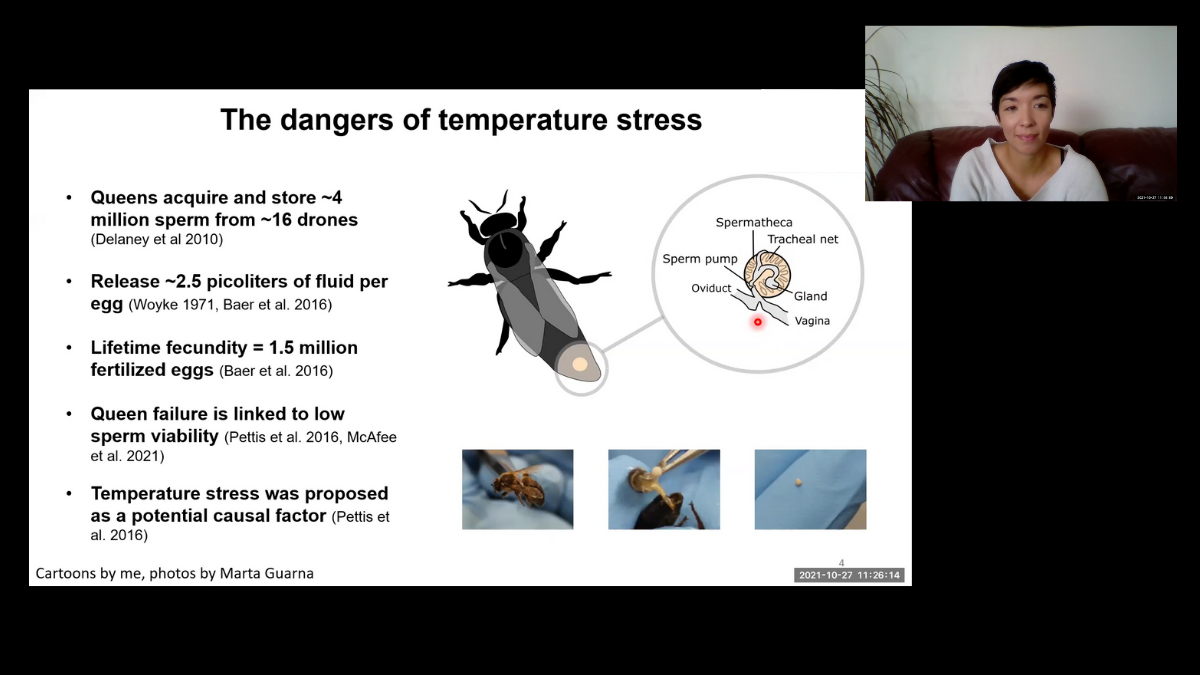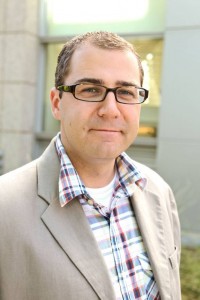
During the virtual Michael John Page Postdoctoral Fellow Award presentation, Dr. Alison McAfee presented her research on how temperature stress affects the sperm viability of honey bee queens.
The UBC Centre for Blood Research (CBR) and Department of Biochemistry and Molecular Biology (BMB) were pleased to host the ninth Michael John Page Postdoctoral Fellow Award presentation on Wednesday October 27, 2021. This year’s award recipient, Dr. Alison McAfee, shared her research on factors affecting honeybee queen infertility, with a focus on temperature stress.
“It is a huge honour to receive this award,” said Dr. McAfee, who is co-supervised by Dr. Leonard Foster of UBC and Dr. David Tarpy from the University of Northern Carolina. “I am so grateful to have this support and recognition.”
Established in 2013, the award recognizes a postdoctoral fellow who reflects the late Dr. Michael Page’s academic excellence and passion for life. Dr. Page was a former graduate student in Dr. Ross MacGillivray’s lab, and was well known for his academic excellence, coagulation research, and love of life, hockey and sports.
“Part of my guiding philosophy is that it’s part of our responsibility as scientists and researchers to engage with the public when there’s something to be told… Public engagement is one of the best tools we have to create meaningful change.”
— Dr. Alison McAfee
During her talk, titled “Causes and consequences of honey bee infertility”, Dr. McAfee spoke about the dangers of temperature stress on the sperm viability of honeybee queens. Her presentation shed light on the biological processes underlying sperm viability, and best practices for keeping honeybee queens and their colonies safe. She also shared some of her extracurricular activities, which include hiking, training and rehabilitating horses at a nearby farm, and science communication work. She writes a monthly column for the American Bee Journal, and has also written pieces for the Gairdner Foundation and Scientific American.
“Part of my guiding philosophy is that it’s part of our responsibility as scientists and researchers to engage with the public when there’s something to be told,” Dr. McAfee said during her talk, about why she communicates her science. “Public engagement is one of the best tools we have to create meaningful change.”
The event was held virtually, with the CBR and BMB communities in attendance, as well as Michael’s father Roger Page and Dr. Ross MacGillivray. Congratulations to Dr. McAfee on receiving the award!
Many thanks to the Page Family, the Michael John Page Endowment Fund, and the Department of Biochemistry and Molecular Biology for their generous support in making this award possible!
- Watch Dr. Alison McAfee’s award presentation: “Causes and consequences of honey bee infertility”
- Learn more about Dr. Alison McAfee and her research in our National Postdoc Appreciation Week 2021 profile
- Learn more about the Michael John Page Postdoctoral Fellow Award
 About Dr. Michael John Page:
About Dr. Michael John Page:
Michael John Page was born and raised in Thunder Bay, Ontario, where he graduated from Port Arthur Collegiate in 1994. He attended Carleton University in Ottawa, graduating with his B.Sc. in Biochemistry in 1998. Following, he entered the Biochemistry & Molecular Biology graduate program at UBC under Ross MacGillivray’s supervision. During his graduate studies, his fellow students recognized Mike’s achievements by selecting him for the prestigious 2001 Zbarsky Prize. He then completed a highly productive postdoctoral fellowship, studying the biological activity of thrombin with Dr. Enrico Di Cera at Washington University in St. Louis, and in 2010, moved to a junior faculty position at the University of California, San Francisco, mentored by Dr. Charles Craik. Tragically, Mike died suddenly in June 2013 at age 36, leaving a legacy of a thirst for knowledge and a love of life.


